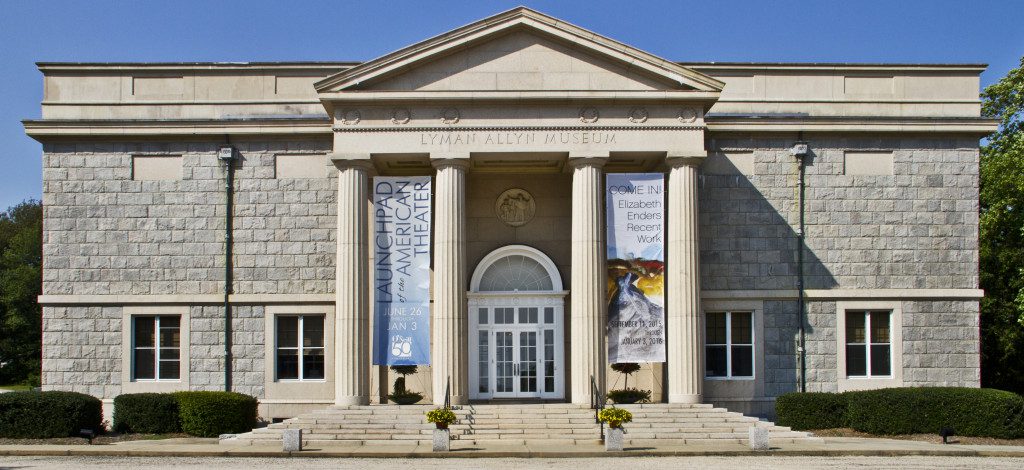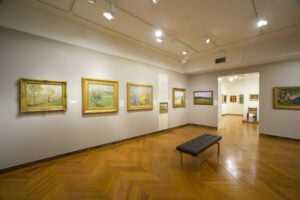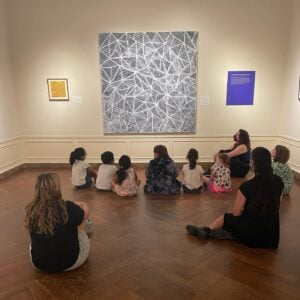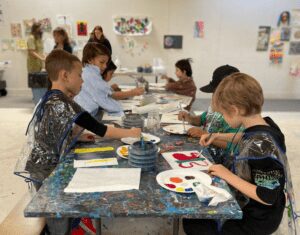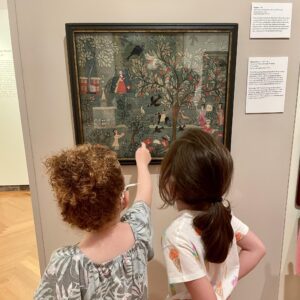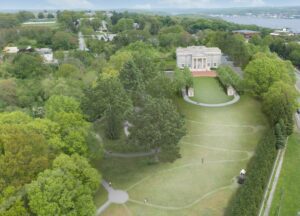FOR IMMEDIATE RELEASE
March 22, 2018
Lyman Allyn Art Museum
Press Contact: Rebecca Marsie, Director of Communications
860.443.2545 x2112 / [email protected]
NATIONALLY TOURING EXHIBITION, SPIRITED: PROHIBITION IN AMERICA OPENS
AT THE LYMAN ALLYN ART MUSEUM
New London – During the era of Prohibition, Americans no longer could manufacture, sell, or transport intoxicating beverages from 1920 until 1933. Spirited: Prohibition in America, a new exhibition opening at the Lyman Allyn Art Museum explores this tumultuous time in American history, when flappers and suffragists, bootleggers and temperance lobbyists, and legends, such as Al Capone and Carry Nation, took sides in this battle against the bottle. The exhibition will be on view from April 5 through May 25, 2018.
Organized by the National Constitution Center, Philadelphia, PA, in partnership with Mid-America Arts Alliance, Kansas City, MO, Spirited: Prohibition in America explores the era of Prohibition, when America went “dry.” Visitors will learn about the complex issues that led America to adopt Prohibition through the 18th Amendment to the Constitution in 1919 until its repeal through the 21st Amendment in 1933. Through the exhibition, visitors will learn about the amendment process, the changing role of liquor in American culture, Prohibition’s impact on the roaring ‘20s, and the role of women, and how current liquor laws vary from state to state.
In 1830, the average American consumed 90 bottles—or about four shots a day—of 80-proof liquor each year. Saloons gained notoriety as the most destructive force in American culture, where men would drink away their families’ money. Following extensive campaigning and lobbying by the Anti-Saloon League, along with groups representing women’s suffrage and the Woman’s Christian Temperance Union, on January 16, 1919, the 18th Amendment to the Constitution was ratified, and beginning January 17, 1920, Americans could no longer manufacture, sell, or transport intoxicating beverages. However, the Volstead act, the law enforcing the amendment, made exceptions for sacramental, medicinal, and industrial purposes as well as allowing families to “preserve fruit” through fermentation.
In the years following, the country was split between “wets” and “drys,” speakeasies flourished, legal authorities gave chase to gangsters, and many created inventive ways to circumvent the law. Governmental agencies, including the Prohibition Bureau and the Justice Department, charged with enforcing the Volstead act were ill equipped to deal with the flood of illegal booze. Along with rampant law breaking, Prohibition brought unexpected cultural and societal shifts from the development of mixed-gendered speakeasies to the growth of organized crime syndicated into national enterprises.
The exhibition draws on the histories told from both sides of this divisive issue that riled passions and created volatile situations. In the end after a decade of wide-spread corruption, wavering public opinion, and the need to generate revenue from an alcohol tax, the 18th Amendment became the first ever repealed. With the passing of the 21st Amendment, Prohibition ended on December 5, 1933 to a very different America. Today, Prohibition’s legacy can be traced through state laws regulating alcohol, created to avoid the excesses before Prohibition and the corruption and lawlessness experienced during the roaring ‘20s.
The Lyman Allyn will host a three-part lecture series in conjunction with the exhibition. On April 12, Dr. David Canton, Associate Professor of History and Director of the Africana Studies Program at Connecticut college, will present a lecture titled “Let the Good Times Roll: Race, Crime and Prohibition;” on May 2, Bailey Pryor, six-time Emmy Award winning documentary filmmaker, will lecture on “Rum Runners of the Prohibition Era” (followed by a tasting of The Real McCoy rum); on May 16, Dr. Robin Jaffee Frank, curator, award-winning author and historian on American visual culture, will present a lecture titled “Cigarettes, Cellophane, and Sex: Art of the American Twenties.” A reception held at 5:30 PM will precede each lecture. Admission fees for the lectures are $10 for members and $15 for non-members. Visitors will have the opportunity to purchase tickets to all three lectures ahead of time for a discounted price of $25 for members and $40 for non-members.
In addition, the Lyman Allyn will hold a Rum Runners and Rug Cutters closing event on May 25, the last day of the exhibition, to celebrate Repeal and the show in style! Attendees will have the opportunity to join dance instructors from Fred Astaire Dance Studio Mystic as they teach popular dances of the 1920’s, such as the Charleston and the Swing. The good times will be rolling at the open bar where classic cocktails from the Prohibition era, like the Gin Rickey and the Mary Pickford, will be offered. It will be a fun evening for people older than 21 as we say goodbye to Spirited speakeasy-style! The event will be held from 6:00 – 8:00 PM and cost $15 for members and $25 for non-members.
Interested participants should RSVP for each event to 860.443.2545 ext. 2129. More information will be available on www.lymanallyn.org.
The opening reception will be on Wednesday, April 4 from 5:00 – 7:00pm. Museum members are free and non-members are $10. Please RSVP to 860.443.2545 ext. 2129.
Spirited: Prohibition in America is based on the exhibition American Spirits: The Rise and Fall of Prohibition, organized by the National Constitution Center in Philadelphia, PA, in collaboration with Daniel Okrent, author of Last Call: The Rise and Fall of Prohibition. Spirited has been made possible through NEH on the Road, a special initiative of the National Endowment for the Humanities. It has been adapted and toured by Mid-America Arts Alliance. Founded in 1972, Mid-America Arts Alliance is the oldest regional nonprofit arts organization in the United States. For more information, visit www.maaa.org or www.nehontheroad.org.
Check the museum website at www.lymanallyn.org and the Museum’s Facebook, Twitter and Instagram page for updates and additional programming.
Tours of the exhibition are available for groups. To schedule tours, call Director of Education, Caitlin Healy at 860.443.2545 ext. 2110 or e-mail [email protected].
For more information or to request images, please contact Rebecca Marsie at 860.443.2545, ext. 2112 or at [email protected].
About the Lyman Allyn Art Museum
The Lyman Allyn Art Museum welcomes visitors from New London, southeastern Connecticut and all over the world. Established in 1926 by a gift from Harriet Allyn in memory of her seafaring father, the Museum opened the doors of its beautiful neo-classical building surrounded by 12 acres of green space in 1932. Today it presents a number of changing exhibitions each year and houses a fascinating collection of over 17,000 objects from ancient times to the present; artworks from Africa, Asia, the Americas and Europe, with particularly strong collections of American paintings, decorative arts and Victorian toys and doll houses.
The museum is located at 625 Williams Street, New London, Connecticut, exit 83 off I-95. The museum is open Tuesday through Saturday, 10:00 am – 5:00 pm, Sundays 1:00 – 5:00 pm; closed Mondays and major holidays. For more information call 860.443.2545, ext. 2129 or visit us on Facebook or the web at: www.lymanallyn.org.

